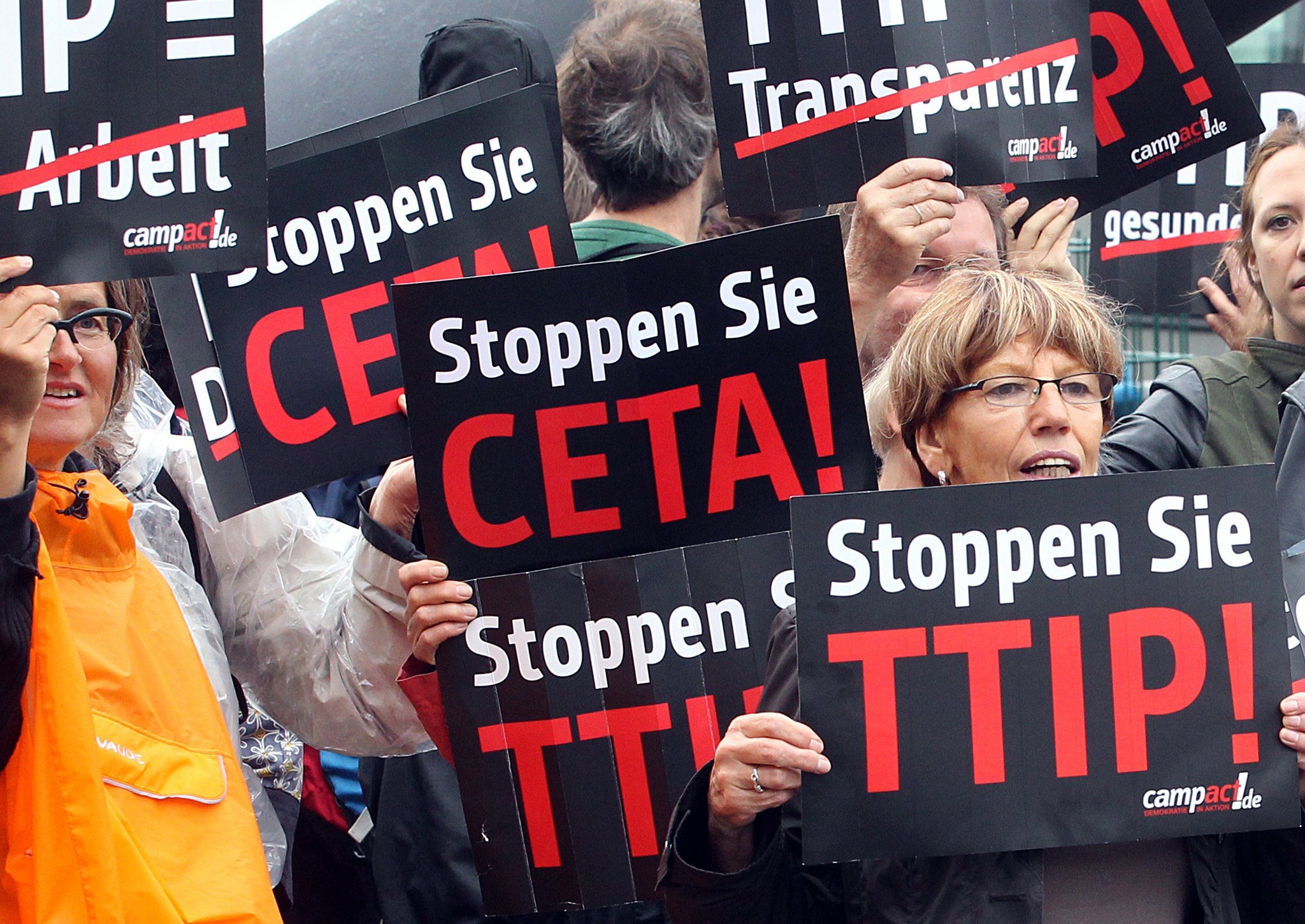If you're worried about TTIP, then you need to know about CETA
It will be the first trade deal of its kind to come before the British and European parliaments, and if it passes the consequences will be disastrous

Canada and the EU signed a deal last year. It had been kept a secret from the public right until the final stages. Once passed into law, it will allow the British government to be sued in secret tribunals by multinational Canadian and American businesses, under a system so arcane that even those who negotiated the deal have admitted that it needs to change.
Despite this, the deal is about to start being pushed through the European Parliament, and then our own parliament, where our representatives are not even allowed to amend it. But they will have a yes or no vote. And they need to vote no.
What is CETA?
CETA – or the Comprehensive Economic & Trade Agreement – is a trade deal between Canada and Europe.
It’s part of a new generation of deals, which includes the controversial TTIP. The thing is, it’s not really a trade deal at all. It's more of an investor’s charter, which gives big business and big finance huge new powers and rights.
The one positive thing about CETA is that it’s no longer secret. It’s already been signed and that means that we’re allowed to see it. Its 1,500 pages of text show us that it's not only a threat to our food standards, but also our battle against climate change, and ability to regulate big banks. What's more, it could even threaten our our power to renationalise industries, such as the railways.
At the heart of CETA is a new legal system, open to foreign corporations but not ordinary people. Let’s say the British government makes a decision. This could be to outlaw dangerous chemicals, improve food safety, put cigarettes in plain packaging, or protect a place of natural beauty from fracking. Under the deal, a Canadian company, or any company with a Canadian subsidiary, can sue the British government if it thinks that the decision is unfair. And by unfair we simply mean they can’t make as much profit as they expected to make. The trial would be held as a secret tribunal, overseen by corporate lawyers, and without any right of appeal.
Canadian companies are already doing this all over the world. A company called Gabriel Resources recently announced it was suing the Romanian government for damages, after parliament blocked the development of one of their gold mines over environmental fears. They now face a compensation claim for possibly billions of pounds. CETA would open this system to thousands more companies, including US companies with subsidiaries in Canada, like Wal-Mart, Chevron, Coca Cola and Monsanto. It is inconceivable that Britain wouldn’t face a case.
Such a furore has been created around these “corporate courts” that the European Commission itself has said they are outdated and need to be reformed. In a consultation last year, 97 per cent of the 150,000 respondents to a consultation exercise said they didn’t want such a system. Yet it’s in CETA – and there’s nothing we can do to remove it short of rejecting the whole thing. And rejecting the whole thing is exactly what we need to do. Here are some of the reasons why:
It will allow toxic tar sands to flow into Europe

Tar sands oil is one of the most environmentally destructive fossil fuels in the world, and the majority of this oil is extracted in Alberta, Canada. The impact on the climate of tar sands is much higher than conventional oil, not to mention the complete devastation it leaves when it’s extracted.
There is currently little tar sands in use in the EU, but that’s changing. When the EU proposed prohibitive new regulations to effectively stop tar sands flowing into Europe, Canada used CETA as a bargaining chip to block the proposal. Now, if CETA passes, that decision will be locked in. Any attempt by the EU to revisit the question would undoubtedly see the EU facing a massive compensation claim from the tar sands industry.
CETA does have a sustainable development chapter, which is a positive move for a trade agreement. But this chapter focuses on fisheries and forests, and doesn’t cover mining, energy or transportation. No wonder the campaign group Council for Canadians says the chapter is “largely aspirational and lacks any effective enforcement mechanism.”
Financial regulation will be weakened, and workers' rights threatened

The whole purpose of CETA is to reduce regulation on business. The idea is that will make it easier to export. But it will do far more than that.
Through the pleasant sounding “regulatory cooperation”, standards would be reduced across the board on the basis that they are “obstacles to trade”. We’re looking at a race to the bottom in areas such as food safety, workers’ rights and environmental regulation.
The ability of governments to regulate financial services would be impaired. Limiting the growth of banks that have become “too big to fail” could land a government in a secret tribunal.
Through something called a “ratchet clause” current levels of privatisation would be “locked in” on any services not specifically exempted. If Canadian or EU governments want to bring certain services back into public ownership, they could be breaking the terms of the agreement.
Britain could lose its culinary identity

The UK has failed to protect UK food standards and labelling while negotiating CETA. The EU has a system for protecting regional food quality and benefiting local economies. That’s why only sparkling wine made in the Champagne region of France can be called Champagne and Cornish pasties can only be be made in Cornwall.
With CETA, France and Italy have negotiated 42 exemptions to protect local products from Canadian imitations, including brie and parmesan cheese. But the UK has failed to protect any of its regional products. Under CETA, we could be eating Yorkshire Wensleydale cheese produced in Ontario and Cornish pasties from Nunavut.
CETA is expected to be ratified by the European parliament in 2016. It’s by no means a done deal, with significant numbers of MEPs baulking at agreeing to such a deal. Nearly three million people across Europe have signed a petition calling on the EU to halt CETA, and the better-known TTIP. In Canada, a campaign has been waged by trade unionists and environmentalists for several years to stop the deal, because it threatens to bring their own country under similar attack from European corporations. A looming election could change the balance of forces for the better there.
CETA will be the first trade deal of its kind to come before the European and British parliaments. A no vote would also make sure it was the last, as it would deal a fatal blow to the corporate lobby’s offensive. Let’s make sure that happens.
Join our commenting forum
Join thought-provoking conversations, follow other Independent readers and see their replies
Comments